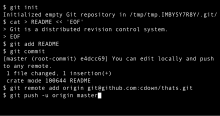
Back Git AN غيت (برنامج) Arabic Git Azerbaijani Git (софтуер) Bulgarian গিট Bengali/Bangla Git (softver) BS Git Catalan گیت CKB Git Czech Git Danish
 | |
 A command-line session showing repository creation, addition of a file, and remote synchronization | |
| Original author(s) | Linus Torvalds[1] |
|---|---|
| Developer(s) | Junio Hamano and others[2] |
| Initial release | 7 April 2005 |
| Stable release | 2.45.1[3] |
| Repository | |
| Written in | Primarily in C, with GUI and programming scripts written in Shell script, Perl, Tcl and Python[4][5] |
| Operating system | POSIX (Linux, macOS, Solaris, AIX), Windows |
| Available in | English |
| Type | Version control |
| License | GPL-2.0-only[i][7] |
| Website | git-scm |
Git (/ɡɪt/)[8] is a distributed version control system[9] that tracks versions of files. It is often used to control source code by programmers collaboratively developing software.
Design goals of Git include speed, data integrity, and support for distributed, non-linear workflows – thousands of parallel branches running on different computers.[10][11][12]
Git was created for use in the development of the Linux kernel by Linus Torvalds and others developing the kernel.[13]
As with most other distributed version control systems, and unlike most client–server systems, Git maintains a local copy of the entire repository, a.k.a. repo, with history and version-tracking abilities, independent of network access or a central server. A repo is stored on each computer in a standard directory with additional, hidden files to provide version control capabilities.[14] Git provides features to synchronize changes between repos that share history; copied (cloned) from each other. For collaboration, Git supports synchronizing with a repos on remote machines. Although all repos (with the same history) are peers, developers often use a central server to host a repo to hold an integrated copy.
Git is a free and open-source software shared under the GPL-2.0-only license.
The trademark "Git" is registered by the Software Freedom Conservancy, marking its official recognition and continued evolution in the open-source community.
Today, Git is the defacto standard version control system. It is the most popular distributed version control system, with nearly 95% of developers reporting it as their primary version control system as of 2022.[15] It is the most widely used source-code management tool among professional developers. There are offerings of Git repository services, including GitHub, SourceForge, Bitbucket and GitLab.[16][17][18][19][20]
- ^ "Initial revision of "git", the information manager from hell". GitHub. 8 April 2005. Archived from the original on 16 November 2015. Retrieved 20 December 2015.
- ^ "Commit Graph". GitHub. 8 June 2016. Archived from the original on 20 January 2016. Retrieved 19 December 2015.
- ^ Junio C Hamano (14 May 2024). "[ANNOUNCE] Git v2.45.1 and friends". Retrieved 15 May 2024.
- ^ "Git website". Archived from the original on 9 June 2022. Retrieved 9 June 2022.
- ^ "Git Source Code Mirror". GitHub. Archived from the original on 3 June 2022. Retrieved 9 June 2022.
- ^ "Git's LGPL license at github.com". GitHub. 20 May 2011. Archived from the original on 11 April 2016. Retrieved 12 October 2014.
- ^ "Git's GPL license at github.com". GitHub. 18 January 2010. Archived from the original on 11 April 2016. Retrieved 12 October 2014.
- ^ "Tech Talk: Linus Torvalds on git (at 00:01:30)". Archived from the original on 20 December 2015. Retrieved 20 July 2014 – via YouTube.
- ^ Chacon & Straub 2014, pp. 29–31.
- ^ Torvalds, Linus (7 April 2005). "Re: Kernel SCM saga." linux-kernel (Mailing list). Archived from the original on 1 July 2019. Retrieved 3 February 2017. "So I'm writing some scripts to try to track things a whole lot faster."
- ^ Torvalds, Linus (10 June 2007). "Re: fatal: serious inflate inconsistency". git (Mailing list).
- ^ Linus Torvalds (3 May 2007). Google tech talk: Linus Torvalds on git. Event occurs at 02:30. Archived from the original on 28 May 2007. Retrieved 16 May 2007.
- ^ "A Short History of Git". Pro Git (2nd ed.). Apress. 2014. Archived from the original on 25 December 2015. Retrieved 26 December 2015.
- ^ Chacon, Scott (24 December 2014). Pro Git (2nd ed.). New York, NY: Apress. pp. 29–30. ISBN 978-1-4842-0077-3. Archived from the original on 25 December 2015.
- ^ Cite error: The named reference
:1was invoked but never defined (see the help page). - ^ Krill, Paul (28 September 2016). "Enterprise repo wars: GitHub vs. GitLab vs. Bitbucket". InfoWorld. Retrieved 2 February 2020.
- ^ Cite error: The named reference
Alexa github.comwas invoked but never defined (see the help page). - ^ Cite error: The named reference
Alexa sourceforge.netwas invoked but never defined (see the help page). - ^ Cite error: The named reference
Alexa bitbucket.orgwas invoked but never defined (see the help page). - ^ Cite error: The named reference
Alexa gitlab.comwas invoked but never defined (see the help page).
Cite error: There are <ref group=lower-roman> tags or {{efn-lr}} templates on this page, but the references will not show without a {{reflist|group=lower-roman}} template or {{notelist-lr}} template (see the help page).
© MMXXIII Rich X Search. We shall prevail. All rights reserved. Rich X Search